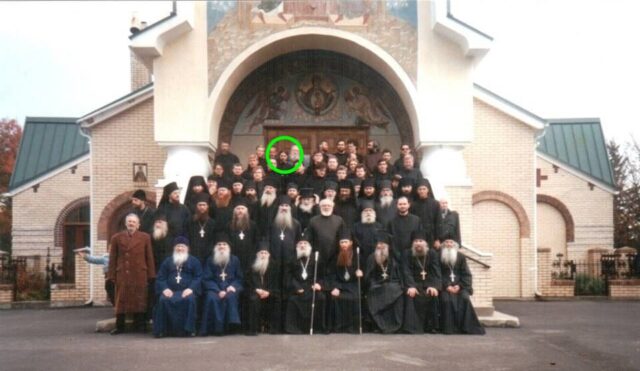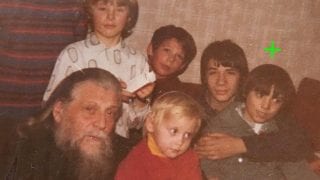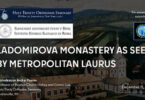We all know that the graduates of Holy Trinity Seminary not only carry out essential ministry for people of God in sacred orders, but also work in various other capacities. One may work in the criminal justice system in Australia while another teaches at a school in Siberia: there is always a need for people who bring kindness and compassion to those around them.
Today we are interviewing Mikhail Steblin-Kaminsky, who was my classmate at Holy Trinity Seminary in the early 90s. Misha is a descendant of pre-revolutionary Russian aristocrats who remained in the homeland, and he is also related to several families that went into exile, including the Trubetskoys, the Rodziankos, and the Chertkovs.
This interview is taking place in Misha’s St. Petersburg apartment, where I arrived early in the morning. Mikhail works in the Addictions Center, where he helps with the rehabilitation of clients suffering from drug and alcohol dependence as well as other addictions.
How long have you been working in this field?
I experienced this type of problem first hand in my childhood, so it kind of became a part of my family history. Being exposed to addictions rather than knowing them only in theory really helped me in my clinical work, and since 2005 I have been doing this professionally.
You have been in the field for a long time then…
Yes, it has been a long time. I also feel very comfortable doing what I do. This type of work not only inspires me, but it also brings harmony into my life and my spiritual life.
Are you saying “you need this type of work”?
I feel that God has been using me as His tool, and I have been receiving all sorts of gifts from Him as a result. I feel He carries us in his palms and takes care of all little problems constantly, and this became possible because of what I do. This type of work is not always appreciated. I come across with people who are angry, aggressive, dishonest, and hard to trust. For me it is important to give every person hope to feel needed and worthy. They often feel worthless and do not love themselves.
They are unable to see that they were created in the image of God. It is possible with time to teach them attain this state of loving themselves as children of God. The goal of our therapy then is to try eliminate that deficit of love which these people received in their childhood. People often develop all sorts of phobias because of lack of love. They choose wrong coping methods which temporarily help them, and then these inappropriate coping experiences lead to theft, lying, dishonesty. At that moment only God can break that pattern, and it can happen in a nonaggressive manner. In other words, we cannot make a person believe or have faith. We need to introduce him to a new permanent world which is completely different from this physical world, which is transitory by nature.
It seems that many of these people have probably experienced an unknown world in a very negative and challenging way? Do they talk about their experiences?
Yes, of course. Those clients who have gone through periods of withdrawal are obviously familiar with that world. They have felt it, and they are afraid of it. Those clients who have tried different types of LSD are also aware of this unseen world. But this is not a spiritual world in a good sense. It is sort of a dark spiritual world which you can enter only from the back fire exit door. And the fact that they are aware of the presence of this dark world prevents them from getting to know a real spiritual world.
I have always felt that that there is a chance of transference when it comes to listening to people’s problems and negative experiences. It seems that it is very easy to start feeling what the other person is opening up about. I asked several priests about it and they said they do not have this problem. You are often in contact with those people who spend long time in prisons, or engage in things that most of us have never experienced. What special techniques do you use to prevent burnout and also not let yourself get hurt in a process?
Indeed, we often listen to stories that are full of negative and destructive experiences typical for an addict. It happens because the goal of the therapy is always reevaluation of the moral aspects of your life. IN other words, clients do retell their stories from their childhoods: their fears, feelings of guilt, shame, and hurt. The therapist, despite his unwillingness to get affected by this negative material does end up getting involved emotionally anyway. It is quite difficult in the very beginning because you start to experience things and feelings you never felt in your life. However, we do use certain mechanisms which help us in this work. We do discuss cases with our staff psychologist, and receive consultation regarding our work with clients, other clinicians and consultants. I also have a spiritual father who is familiar with my background, my current work, and the range of difficulties and inner feelings, which I may be coming across in my work. My spiritual father understands that an addict who decides to fight his addiction resembles a monk. Just like a monk an addict realizes that when he is in a difficult situation, using the coping method he knew and used before will bring his death. During these moments the help of the psychologist, crisis worker, or a sponsor is crucial, and should be available 24/7.
In other words, any client can call you 24/7?
My phone is on all the time. I receive phone calls from former and present clients, co-workers, and other people. Our policy does not allow us to provide phone consultations so we usually invite a caller to come to our office for an inperson session. However, it often happens that a person cannot come to the office.

Brethren, seminarians and residents of Holy Trinity Monastery and Seminary. 1993
We come across different situations when it comes to dealing with drug addicts in this part of St. Petersburg. There over 200 various addictions, but 75% of them are of course, alcohol and drug addicts.
Can you, please, explain specifics when it comes to this district of St. Petersburg?
Well, St. Petersburg is a city with ongoing criminal activity. When young people engage in all sorts of addictive behaviors they do not yet feel their full impact until they turn 23. When people become older they start realizing that their addiction has taken a toll on their emotional, financial, spiritual, moral and physical areas of their functioning. In other words, they reached the bottom! And on this level we definitely can help these people get up, and start making small steps into a real life where they can learn to solve problems in a daily basis. Only this ability to solve real life problems in a healthy manner can help them become normal, self-sufficient individuals. Indeed, why do we come into this life? I think we are born to be happy, joyous, successful, and wanted. Often people do not understand this. To be a victim is a choice. People like to be victims because it is also sort of an addiction. Many prefer to remain victims because this position justifies their lack of action. We need to get people out of this state, to shake them up and to help them realize that all our assets and talents can be acquired only through love, and this love needs to be strong.
I think there are also some people who hold on to their specific “baggage” of learned behaviors from the past. This can refer to certain type of upbringing, psychological or even genetic types of behaviors, for instance. On one hand, you would like to change, but on the other hand, it’s extremely difficult for you to get rid of this “baggage” that you have stored for years. It resembles a person trying to climb an icy hill on his own.
Correct, Fr. Andrei. I can say for sure that no one can overcome chemical addiction on their own. Of course, there are those addicts who undergo a “coding” therapy hold on to this coping strategy since this is the only method they feel they can use to stop an addictive pattern. However, these procedures are considered inhuman throughout the world since “coding” does not address deeper emotional or psychological problems that people tried to address through drinking or taking substances.
Are “coding” procedures legal in Russia?
A: yes, they are still legal. What we do anamnesis (that is we screen) our clients and try to find any “anchors” that are still left in their lives and can help them at the moment.
What a nice Greek word!
Yes, sure, we are always looking for anchors in any area of client’s life: childhood, work, maybe past military service, that can be tied to the addict and help him start the recovery process. If a client has a good job, for instance, it might it not be necessary to make him leave his workplace at the moment of treatment. Maybe he has a loving family or a supportive sibling, we need to make sure the client continue to interact with his family in this case. However, no matter how good a supportive system can be, addicts cannot break their cycle of addictions on their own, without God’s help.
I must tell you that your clinical work is a great type of Christian service. If we advise someone not to attend Church services or not to fast, people will usually look at us as heretics and not Orthodox Christians. However, if we insist on the need to help others, here not everyone will understand the importance of this type of service. We may hear, “well, if you have time, sure, you can do some charitable or human service work”. But this type of activity should be equally important. So, your work makes any priest’s or layman’s life complete. Are there many Christians, mainly Orthodox Christians, in this profession? Are they represented mainly by individuals or organizations, specifically in St. Petersburg?
Our clinical staff working with chemical dependent clients are all Orthodox Christians, of course. However, spirituality is not our main focus in the beginning of treatment. When clients with addictive behaviors feel that they know God or a Higher Power, it is not correct, of course. It’s impossible to be a believer and an addict at the same time. We need to help clients find characteristic of their own higher power at the moment, complete their treatment , and only then they can become Church goers. This false assumption about having a connection with a Higher Power before a counseling process can actually impede the whole treatment. We follow a “12 step program”, a Model originally developed in Minnesota. But these 12 steps for clients with alcohol addiction in a treatment is like milk given to a baby. Both a drug and alcohol addict resembles a baby without teeth. When they reach the 12th step, they are actually ready to work through their 5th. During this time they should talk with their spiritual father, preferably in Church, have a Confession, receive forgiveness of sins, and then continue their treatment process as an Orthodox Christian. I received a lot of support from my spiritual fathers during my years at Holy Trinity Seminary, of course. I cannot even imagine where I would be now without support and directions from Father Kyprian (Pyzhov), my spiritual father, or Father Sergei (Romberg), for example. Their role in my life cannot be even described. Until this time I often remember Fr. Luka as well. I would like to use this opportunity to thank my aunt Matushka Maria Potapova and Father Victor without whose self-sacrifice compassion, love and patience I wouldn’t have been here today. I am also greatful to Oleg M. Rodzianko who also helped me a lot. Actually, this is my first interview, and I am little nervous. Maybe I will say something that I shouldn’t…
Well, I definitely can’t see it. On the other hand, I think we are doing pretty good here with format, everything is clear and organized.
I also would like to mention that it was not completely my desire to enter Seminary. A situation occurred that was good for me to start my studies there, I think it was God’s will. I often tried to find reasons for me going to study abroad, to the US. There was no one in my family with the same history as mine, everyone stayed home, in our country. My path was somewhat mystical. Nowadays when I look behind I realize that it was God’s careful plan, and it was even humorous at times. I don’t even have to be stressed out about anything: all I have to do is to listen carefully, relax and trust God. I sensed at one time in the Seminary that I became truly interested in what I was studying. I can observe about my clients the same thing. They mostly come here against their wishes. Usually it is a family member who brings them here. And of course, I notice how each client starts changing in the process of treatment. They shift their focus from addiction towards creativity, inspiration, and innovation. Their personalities also change a great deal. This process is simply amazing because I can literally watch God do His delicate work in front of my eyes, and this makes my heart tremble.
I am little confused about what you said earlier though. When an addict thinks he knows God, you feel this to be not true. But can’t we attribute this attitude to all of our sins? We sin all the time, and we can definitely say that at the moment we do not know God. So, this approach seemed to me somewhat “black-and-white”, but in real life I think we have more of a “grey” color, thing are difficult to discern, no matter if we talk about churched people or not. I feel addictions resemble all our other sins, even though they are somewhat different, more severe form of sin. However, no matter what type of severity or complexity is there, it is still considered sin and it is the same matter we are dealing with, correct? So, what we have then is that we can’t call ourselves Orthodox Christians when we sin? This approach seems to me a bit harsh, what do you think?
Well, first of all I do not agree when we label alcoholism as “sin”. Alcoholism is a disease. Sure, it is an immoral state, but it is a disorder, a disease. So, when a person in this condition think certain things, you know….Very often we think we know and love God. But let’s think about the meaning of the word “Love” for a second. Love is the presence of knowledge, first of all. Secondly, it is responsibility, and finally, Love is practice. Then comes comfort. When an individual thinks he knows and loves God but never goes to Church, does not read the Holy Gospel, it is better to tell him the truth: “You do not know God”. We need to tell him: “ I do not know who told you know God. Maybe you thought about it yourself, and maybe you consider yourself to be a Catholic, or an Orthodox, it doesn’t matter. No matter how you came to this conclusion, it is wrong. You do not know the real God. So, please, forget what you thought about this matter earlier”. And then, as I said before, we start giving this person some milk, then little cereal from a spoon, and then when he starts “teething”, he will see with different eyes that God exists. You will get to know Him then, and will realize that this is the most important part of your life, your rebirth, so to speak. Until you find God, your life is not real. You do not exist until you meet God. You harm yourself at this time, and of course, you harm your loved ones. But I also realize that we need every person no matter what his condition is, and everyone has his own path in life. Even when our clients leave therapy and continue engaging in inappropriate behaviors, I still have respect for them. It means that at that moment God still needs them in that particular condition. I may not understand the reason for that, but I do respect their choice. It is their life, and they need to be loved in any condition simply because they were created in God’s image. If God created them, they are needed.
Thank you, Misha. There is a lot of food for thought.
I also wanted to add…
Please
It is very important for us to introduce our clients to God. Why has any person left God? It probably happened because they can’t grasp the reality of a spiritual world as a result of their secular upbringing. They show defiance towards our secular world, although this visible world is not that important. The inner world of each person is actually more realistic and important. So, a person starts gradually to understand what is happening inside him, and he can see how God works in his inner world. The Kingdom of God is within Us! Our God the Savior lives inside us! So, a person then starts looking at the physical, visible world from a different angle, and the person’s soul then wakes up.
What do priests need to know when they interact with people who have addictive behaviors? What do they need to know?
Good question. And I am glad you asked. Just imagine it I came to my spiritual father, Fr. Sergei, and told him, “Father, I have a terrible toothache. Please, help me!”. He would have said, “Misha, are you out of your mind? Go to the dentist, go to the pharmacy, buy some analgesics, but I can’t’ help you”. So, the only thing that a priest can do for addicts is to pray for them. We can’t underestimate the power of prayer, and we should be thankful that there are people who can pray for us. However, most priests are very incompetent when it comes to people with addictions. Chemical addition is a very serious illness. It progress complex, it is progressing fast, and it is often incurable. So, the first thing any priest should do when he sees an addict is to refer him to an addiction specialist. There are many rehabilitation centers with faith-based approaches to treatment. I have been in this field for about 13 years, and unfortunately I often see how this type of spiritual centers actually makes things worse. Addicts are made to pray, and very often they are not ready for it, they start using drugs even more, and die. So, we can say that rehabilitation centers with spiritual coping tools can be as dangerous as “coding” procedures for addicts. This type of client requires love, patience, and a gentle approach. In other words, we need to give addicts everything they lacked in their childhood, what their mothers failed to give them. They need it.
Misha, thank you for this talk, and for your time. You know, I didn’t expect this when I got to St. Petersburg.
At 7 am, right?
Conducted by Deacon Andrei Psarev,
Translated by Vera Mumbauer













